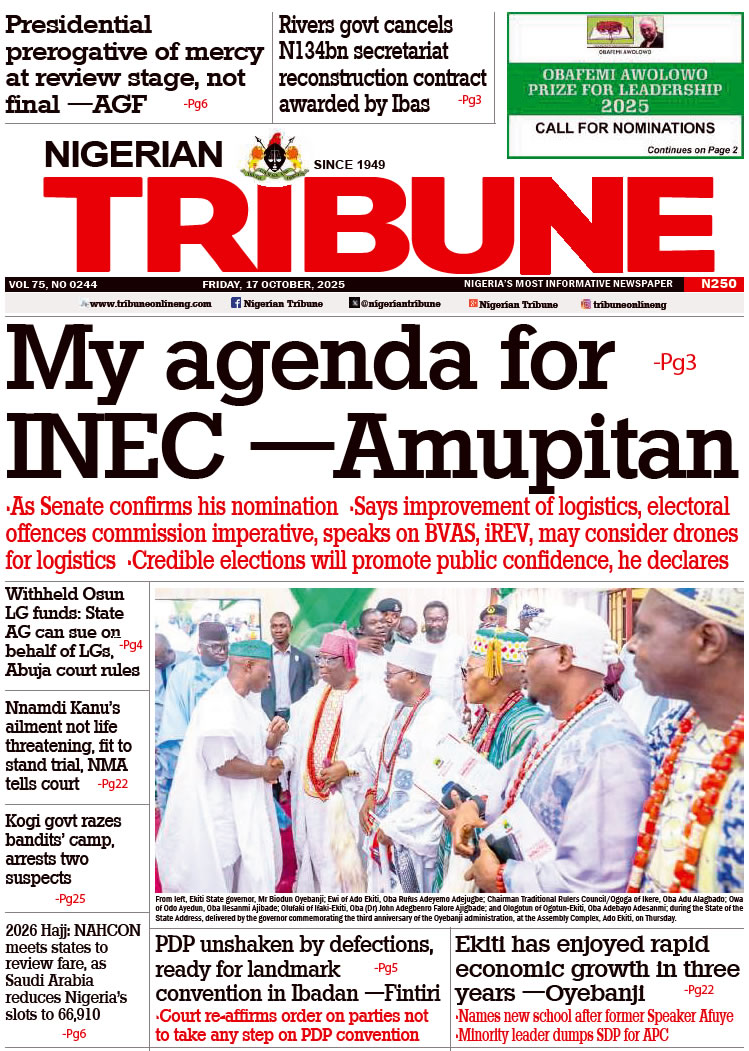Chioma Ude is the founder, African International Film Festival (AFRIFF) and owner, Lavida Studios. In this interview by SEGUN KASALI, she talks about how she started the festival among other issues.
Have you ever envisaged delving into Film production?
Yes I am very organic in my growth and it is very intentional. I like to understand what I am going into before I even jump into it. So, it was bound to happen. In running the film festival, you have got to understand where you lack and where to plug in.
You had this in mind while growing up?
My maternal uncle would tell all about it, whenever they asked me while I was young what do you want to do? I won’t talk but it clicked that I would go far. I was always the dancer in the family, story teller and all of that. My uncle and his sister always say that it is just natural to you. But, I was also very shy. I never took that front stage. I did a lot of dance competition while I was young. There was a particular song, whenever I and the people in my set hear that song we always dance.
What was your ambition at that time?
I did not have. Again because I was a very smart kid, I did all sciences. And I remember the pressure on me was so much to be a doctor. My parents would be like how can you study physics, chemistry and biology and not do anything with it? But then, one fundamental thing was that I liked people a lot and I could sell anything to you. So, my elder brother would always say Chioma you should go into marketing. You would really enjoy it. That was what I did.
You eventually studied marketing?
Yes, I did at the University of Nigeria, Nsukka. I really disappointed them by not studying Medicine or any science related courses that they wanted me to. Marketing gave me the opportunity to talk to and be with people. As at that time, that was what I knew.
How was the marketing career?
Yes, it was very easy. It came natural to me. I love advertising. I love Public Relations. I was very grateful to my brother for letting me do that because it came natural to me and I did not feel like I was studying.
Do you think you picked any of that from parental traits?
My mum was exceptionally entrepreneurial. She is amazing. My mum was a teacher who taught a lot of students in secondary school and later went to study law. But, one thing that was consistent was her business acumen. So, I believe I got that from her. My father, on the other hand, was a member of every club. He was very social and was a dancer too (laughs).
There was a time my dad came to school and I was the presenting act. So, dad came on our prize giving day. I was the entertainment act but I danced to the extent that everyone was clapping for me.
When did you go into film production?
I started very easy. I started trying to fund films, made a lot of connections for people. Whenever I need this or that, I would find it from anywhere. I was doing premiere for people and then it got serious three years ago. I knew all that was lacking. First, I started working with people in a ‘you go do it and come back to me’. For some, it worked but it did not work for a lot. So, I decided I was going to be in it to win it. But then, I would tell you what my skill sets are. I am a story teller and I have always been a story teller and I write scripts. And what is very interesting is that people send their scripts to me from America and London and I would work on them and send back to them. It was not done for a fee and I was doing more of it. I am reading everyday. There is a film we are going to do in September. It was written by two Oscar award writers. So, that would be the first we going to be doing.
When did you experience breakthrough in this career?
I haven’t (laughs). I always task myself constantly. So, in running the film festival, my highlight so far has been Amazon coming to Africa and using my festival as a platform. So, that is a high point for me. This was because it brought competition to the game. There was nothing like it is only Netflix anymore. Netflix came with something really fresh and different. So, I was very happy to be part of that.
How is that playing out now?
It is playing out really good. I am an aggregator for them, Amazon Prime Video. Netflix came up in a very cliquish way but they came to AFRIFF because they could do it from Africa at a time. They had a lot of conversation during the festival.
What birthed AFRIFF?
There was a challenge that came to Nigeria and I was chosen to be the Project Manager at some point. I ran it very well. So, the then commissioner in Porthacourt, Marcus Nneji said Chioma we have to bring this to Africa. We have to own something of this standard. So, I said to him it is too big and how am I going to get the finance? He said don’t worry. My mentor as at that time was Douglas and I asked him what do you think? He is dead now, but, I remember he said I was going to be by you. So, with all these three people, I felt better. So, I did the first one in Porthacourt and ran it on my own thereafter.
What are some challenges you experienced at first?
It was not hitch-free. You would get to know me. Nothing is a challenge to me. I keep pushing. My friend, Bolanle, usually asked “are you sure? Are you okay?” I just keep doing it.
What are you doing differently this year?
Now, the biggest deal for us is that we signed this partnership with Dentsu. That is huge. The deal is the story lab owned by them. We are going to be making African stories for global platforms.
Do you have any African stories in mind?
We have different stories. We can’t tell it all. Now, we have chosen one that I absolutely love and it shows that civilization actually started from Nigeria. That is a TV series. There is a film that is going to be about football. There is a film about ills of Nigeria and one on Senegal. So, it is all about picking all those stories
Why are you particular about African stories?
So that everyone gets to know us better. We have to tell our story so that everyone gets to hear us and know the continent better.
Your company received $50 million dollars with Dentsu. How are you going about this to affect the country positively?
Firstly, we are building a studio of international repute. It is already 60 percent built out. That would bring employment to so many people. There will be enhancement of skill set and training. So, all of that would be done in that place. By then, if you have international productions, there would be a home for that. The people building it are from America so the dimension and height would go according to the way they do it abroad.
What is expected after the studio completion?
Let me say this-AFRIFF is an international festival that continues to bridge the gap. But, because of this signing, the interest is a lot bigger than what it was. There will be masterclasses, training and retraining of Nigerians. It is just that we have more than one Oscar award winners inside. So, we will just amplify what we have always done. And the difference i see is that we will be announcing pitching sessions to different platforms. After then, we will announce who is working with you. We are going to see more of Nigerians working with international persons in a space.
How have you been combining the home front with career?
You are talking to someone who sees no obstacles (laughs). So, I just keep doing it as I go. Some work some don’t work. That is life. I don’t take anything too serious. People always ask why I am always happy.
What is your position on the statement that males are better leaders than females?
Of course it is not true. I am very strong about that. That is not true. I believe women are better leaders actually. I don’t believe we are equal. We are far better. We are created that way.
What should we expect from Chioma Ude in the coming time?
For me, my happiness is in people, how I relate with people, deal with people and help them. We have trained so many people, sent them abroad every year and now we can take those people into employment and see our stars go aboard. I want to set standards for payment in the industry. We don’t have any studio of such and so we are going to be creating jobs for people and teach them to learn to use different tools in the studio. All those skill sets are going to be transferred to different people in Nigeria.
What do you think African film producers should improve upon?
African film producers should improve on story telling. One of the first announcements we are going to make is the story lab. We want to create a story lab. We are going to do this every year. People need to know how to write for global appeal. We need to tell our own stories and tell them well. So, we are going to kick that off with a big program and it would end in that festival. It will go into proper shoot next year.
What is your advice to the would-be Chioma Udes?
I would say run your race. Don’t look toward what anybody is doing. Know yourself and what you want to do. Focus on it. Anytime you are looking at someone else, they are taking away from your time and your space. So, keep moving and ignore it. Take calculated risks.
How do you socialise?
I have my own small group of people. I don’t like big events. So, you won’t see me. When I go to an event, it means I am very attached to that person.
ALSO READ FROM NIGERIAN TRIBUNE
- Nurse Holds Doctor Hostage In OAU Teaching Hospital, Resident Doctors Plan Strike
- Woman’s Corpse, Unconscious Man Found Inside Office In Aba After Four Days
- Hoodlums Attack Lagos Governor’s Press Crew Bus In Tinubu’s Convoy, Two Injured
- [BREAKING] #EkitiDecides2022: INEC Declares APC’s Biodun Oyebanji Winner Of Guber Poll
- Top 10 Business Ideas In Nigeria You Can Start With 100,000 Naira
- 2023: Kwankwaso Will Not Be Deputy To Obi —NNPP
WATCH TOP VIDEOS FROM NIGERIAN TRIBUNE TV
- Relationship Hangout: Public vs Private Proposals – Which Truly Wins in Love?
- “No” Is a Complete Sentence: Why You Should Stop Feeling Guilty
- Relationship Hangout: Friendship Talk 2025 – How to Be a Good Friend & Big Questions on Friendship
- Police Overpower Armed Robbers in Ibadan After Fierce Struggle






